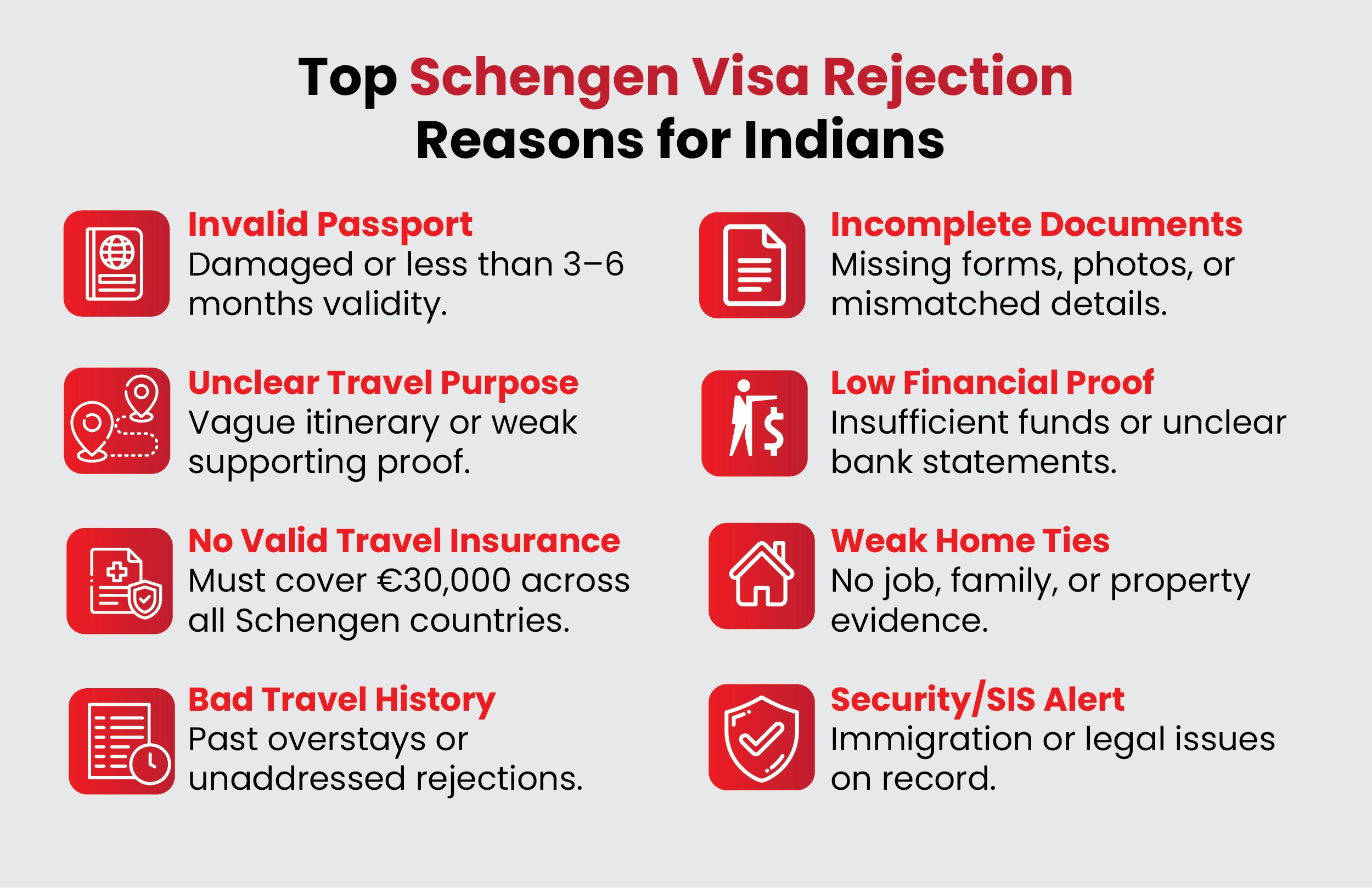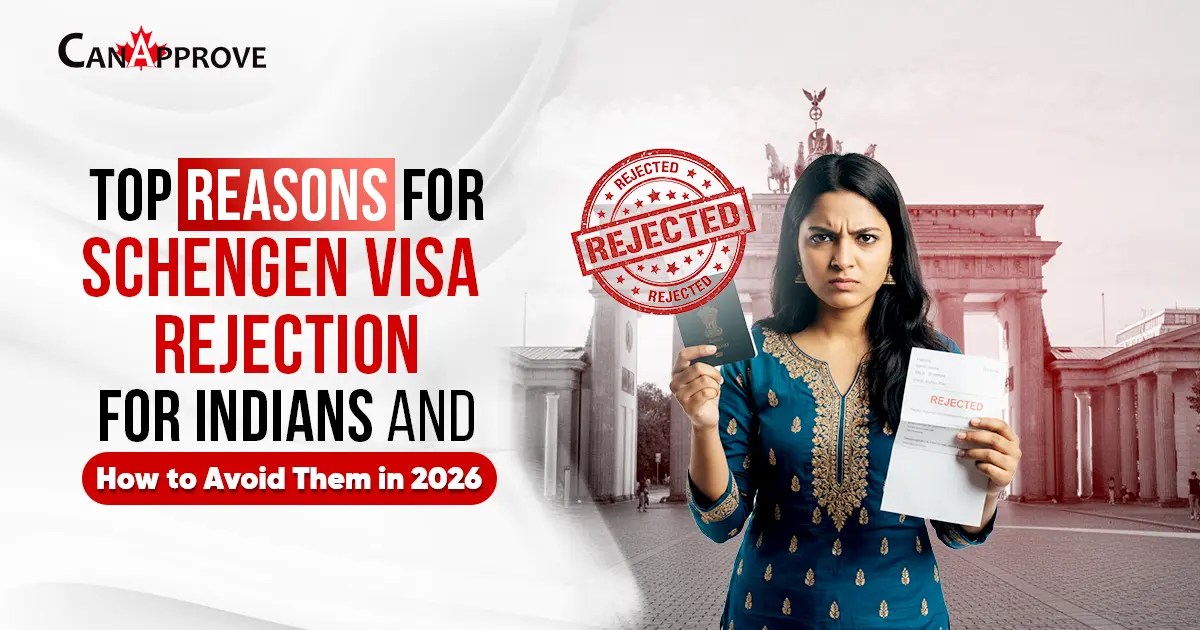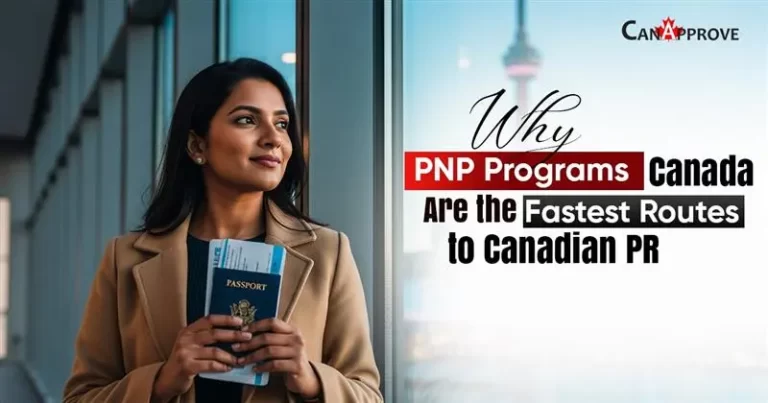Facing a Schengen visa rejection can be disheartening!
Especially after you’ve spent weeks preparing documents and planning your dream Europe trip. Every year, thousands of Indians apply for a Schengen visa, and while many succeed, others receive the dreaded refusal letter. The Schengen visa rejection rate for Indians in 2024 was around 15 %, which means that one out of every six applications was refused.
But why does this happen? What went wrong? In this blog, we’ll break down the top reasons behind Schengen visa refusal and share how you can avoid them in 2026.
Table Of Content
1Why Does the Schengen Visa Get Rejected?2Schengen Visa Rejection Reasons for Indians3Schengen Visa Rejection Rates by Country (2024–2025)4How to Avoid Schengen Visa Rejection in the Future5What to Do After a Schengen Visa Rejection6The Bottom Line7Frequently Asked Questions
Why Does the Schengen Visa Get Rejected?
The Schengen visa rejection mostly boils down to insufficient documentation, inconsistencies in information, or unclear travel intent. The visa officers must be convinced you’ll return to India after your visit and that you have the means to support yourself abroad.
Common early mistakes include:
- Submitting fake or incomplete documents
- Unclear travel itineraries
- Insufficient proof of financial stability
- Poorly written cover letters or travel plans
Even small details, like mismatched signatures or vague employment letters can also raise red flags.
Schengen Visa Rejection Reasons for Indians
Getting a Schengen visa rejection can feel frustrating, especially when you’ve done your best to prepare.
But the good news? Most refusals happen for predictable, fixable reasons.

Let’s look at the most common schengen visa refusal reasons for Indian applicants:
1. Invalid or Damaged Passport
A worn-out, torn, or incomplete passport (missing pages or with less than 3–6 months validity after your return) leads to an automatic rejection. Your passport is your primary identity proof — it must be valid, clean, and machine-readable.
2. Incomplete or Incorrect Documentation
One of the top Schengen visa rejection reasons for Indians is inconsistent or missing paperwork. Incomplete application forms, mismatched dates, or missing photographs can all raise suspicion. The embassy wants precision — every line and signature must match your story.
3. Unclear or Weak Purpose of Visit
If your itinerary sounds vague or your purpose isn’t backed by proper documents (hotel bookings, invitation letters, or conference details), your application might be viewed as unreliable. Visa officers reject applications that seem too flexible or too vague.
4. Insufficient Financial Means
You must prove that you can afford your entire trip — travel, accommodation, and daily expenses. Submitting bank statements with insufficient balance, unclear income sources, or large last-minute deposits often triggers rejection.
5. Missing or Invalid Travel Insurance
A Schengen visa refusal often happens because of incorrect travel insurance. You need a policy that:
- Covers at least €30,000 in medical emergencies
- Is valid across all Schengen countries
- Covers your entire travel duration
6. Doubts About Return to India (Weak Home Ties)
The embassy must be convinced you’ll return home. Weak evidence of ties — such as no stable job, family commitments, or owned property — can make them suspect you intend to overstay. Always include employment proof, family affidavits, or property ownership documents.
7. Previous Overstay or Negative Travel History
A history of overstaying in any country or previous Schengen visa rejection can hurt your credibility. Visa officers check global travel records, not just Schengen ones. Maintain a clean travel history and explain any past rejections honestly in your cover letter.
8. Security or SIS Alert
If your name appears in the Schengen Information System (SIS) due to previous offenses, immigration violations, or alerts, the consulate is obligated to refuse your application. These are non-negotiable denials, and the only solution is to clear your record before reapplying.
Schengen Visa Rejection Rates by Country (2024–2025)
Schengen visa rejection rates vary widely between countries, with some consulates known for their stricter document scrutiny and higher refusal proportions. Smaller nations like Malta and Estonia often top the list because they process fewer applications but maintain rigorous standards.
Schengen Countries with the Highest Rejection Rates (2024–2025 Data)
| Country | Rejection Rate (%) | Applications Processed | Rejections |
|---|---|---|---|
| Malta | 38.5 | 45,578 | 16,905 |
| Estonia | 27.2 | 12,125 | 3,291 |
| Belgium | 24.6 | 255,564 | 61,724 |
| Slovenia | 24.5 | 18,171 | 4,417 |
| Sweden | 24.0 | 188,623 | 44,576 |
| Denmark | 23.7 | 132,158 | 31,013 |
| Croatia | 19.3 | 42,165 | 8,003 |
| Poland | 17.2 | 111,538 | 19,277 |
| France | 15.8 | 3,000,000 (approx.) | 481,139 |
| Czech Republic | 15.8 | 150,629 | 23,735 |
What These Numbers Tell Us
While France receives the highest number of Schengen visa applications overall, its rejection rate is lower compared to smaller nations. This is largely because larger consulates have standardized procedures and greater capacity to handle high volumes efficiently.
So, don’t panic if your chosen country has a higher rejection rate, just make sure your documentation is airtight. Consistency, transparency, and a clear travel plan can turn those numbers in your favor. To reduce the chances of rejection, it’s important to submit a well-prepared application. Here’s a complete step-by-step guide on how to apply for a German Schengen Visa from India
How to Avoid Schengen Visa Rejection in the Future
Rejection doesn’t mean the end, it means the beginning of doing things right. Here’s how you can improve your chances:
1. Provide accurate and consistent information. Every document must tell the same story.
2. Show strong ties to India — family, job, property, or business ownership.
3. Use a clear travel itinerary with confirmed bookings and daily plans.
4. Buy the right insurance policy that meets Schengen requirements.
5. Apply through a trusted consultant who understands embassy-specific trends like CanApprove consultancy.
If you’re applying for a Germany Schengen visa, ensure your documents are translated (if needed) and that your travel purpose aligns with your visa category.
What to Do After a Schengen Visa Rejection
If your Schengen visa application is rejected, you still have two options: you can either appeal the decision or reapply after correcting the issues mentioned in the refusal letter.
1. Understand the Reason for Rejection
Carefully review your refusal notification. It will list the reasons for rejection and specify whether you have the right to appeal. Understanding and addressing these reasons is important before taking your next step.
2. Appeal the Decision
Under Article 32(3) of the EU Visa Code, many Schengen countries allow applicants to appeal a visa refusal.
- Your rejection letter will mention if an appeal is possible, how to file it, and which authority to contact (e.g., Germany’s Administrative Court or Italy’s Regional Administrative Tribunal).
- Appeals must usually be filed within 15–30 days of receiving the refusal.
- Draft a formal appeal letter addressing the refusal reasons and include all necessary supporting documents.
- Remember: You can appeal only once for the same rejection.
3. Reapply for a Schengen Visa
There’s no mandatory waiting period to reapply after a rejection.
- Reapply only after resolving the issues listed in your refusal (e.g., incomplete documents, unclear travel plans, or insufficient proof of funds).
- Submit a new application with updated documents and pay the visa fee again.
- Though not required, waiting about a month before reapplying gives you time to prepare a stronger file.
- Reapply to the same country, unless your travel plans have significantly changed.
- To know more about the Schengen visa, refer to the official website of the European Union.
The Bottom Line
A Schengen visa rejection isn’t a dead end; it’s feedback in disguise. The key is to learn, adjust, and prepare better next time. Whether you’re planning to visit Paris, Berlin, or Rome, precision and honesty go a long way.
When in doubt, seek expert assistance. With CanApprove by your side, you don’t have to navigate the process alone. Our Schengen visa experts help you prepare accurate documents, meet every requirement, and boost your chances of approval.
Professional consultants like CanApprove can help you craft a flawless file — one that says, I’m ready, and I meet every rule.
Frequently Asked Questions





